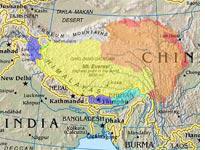Why does China want Tibet?

China's interest in Tibet stems from a long history of political, economic, and strategic factors. The annexation of Tibet by the People's Republic of China in 1950 marked the beginning of a complex relationship between the two regions. China viewed incorporating Tibet as a way to secure its borders and address defense concerns in the southwest. However, Tibet's history as an independent region with its own cultural and religious identity has led to tension and conflict between China and Tibetans.
In recent years, China's interest in Tibet has been driven by economic factors, with the region being rich in natural resources such as minerals and water. China has invested heavily in Tibet's infrastructure, including the construction of railways and highways, to exploit these resources and stimulate economic growth.
However, this development has also raised concerns about environmental impact and displacement of Tibetan communities.
Another key factor behind China's interest in Tibet is geopolitical. Tibet's strategic location near the borders of China, India, and other countries in the region has made it a valuable asset for China in terms of border security and territorial control. China's presence in Tibet also allows it to project power and influence in the region, particularly in its ongoing border disputes with India.
China's policies in Tibet have been a source of controversy and criticism from human rights groups and foreign governments. The Chinese government has been accused of human rights abuses and cultural suppression in Tibet, including restrictions on religious freedom and political expression. The annexation of Tibet by China has also been condemned by the international community, with some countries recognizing Tibet as an independent state.
Despite these criticisms, China remains committed to its policies in Tibet and views the region as an integral part of its territory. The Chinese government has implemented various development projects and policies in Tibet to promote economic growth and social stability. However, the ongoing tensions between China and Tibetans continue to be a source of concern for human rights advocates and policymakers.
In conclusion, China's interest in Tibet is driven by a combination of political, economic, and strategic factors. The annexation of Tibet by China in 1950 laid the foundation for a complex relationship between the two regions, marked by tension and conflict. China's development projects and policies in Tibet have brought both opportunities and challenges for the region, with concerns about human rights abuses and environmental impact. The ongoing tensions between China and Tibetans are likely to persist, shaping the future of Tibet's relationship with China.



